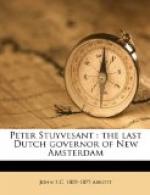A friend of Governor Stuyvesant, in Boston, sent word to New Amsterdam of the arrival of the fleet and its destination. An express was instantly dispatched to Albany to recall the Governor. He hurried back to the capitol, much chagrined by the thought that he had lost three weeks. Every able-bodied man was immediately summoned to work at the city defences, “with spade, shovel and wheelbarrow.” This working party was divided into three classes, one of which was to labor every day. A permanent guard was organized. The brewers were forbidden to malt any more grain, that it all might be reserved for food. Six pieces of cannon were added to the fourteen already mounted. The garrison at Esopus was summoned to the defence.
About the 20th of August, the English squadron anchored in Nyack Bay, just below the Narrows, between New Utrecht and Coney Island. A strict blockade of the river was established. All communication between Long Island and Manhattan was cut off. Several vessels were captured. Upon Staten Island, about three miles from where the frigates rode at anchor, there was a small fort, a block-house, about twenty feet square. It had been constructed for defence against the savages. For its armament it had two small guns, carrying one pound balls, and a garrison of six old invalid soldiers. A party was sent on shore, in the boats, which captured the fort and also a lot of cattle.
The next morning, which was Saturday, Colonel Nicholls sent a delegation of four men up to fort Amsterdam, with a summons for the surrender of “the town situated on the island commonly known by the name of Manhattoes, with all the forts thereunto belonging.” At the same time proclamations were scattered abroad, forbidding the farmers from furnishing any supplies to the Dutch garrison, under penalty of having their houses fired. All the inhabitants of the surrounding villages, who would quietly submit to his Britannic Majesty, were promised the safe possession of their property. Those who should otherwise demean themselves were threatened with all the miseries of war.
Governor Stuyvesant had but one hundred soldiers in garrison. He could not place much reliance upon the aid of undisciplined citizens. Still his brave spirit was disposed to present a desperate resistance. He called his council together, but was unwilling to have the people know the nature of the summons, lest they should clamor for a surrender.
But the citizens held a meeting, voted in favor of non-resistance, and demanded an authentic copy of the communication, which had been received from the commander of the English fleet. They adjourned to meet on Monday morning to receive the reply. Governor Stuyvesant was greatly distressed. After the Sabbath he went to the meeting in person, and endeavored to convince those present of the impropriety of their demands. But the citizens, trembling in view of the bombardment of the town, were in no mood to listen to his persuasions.




